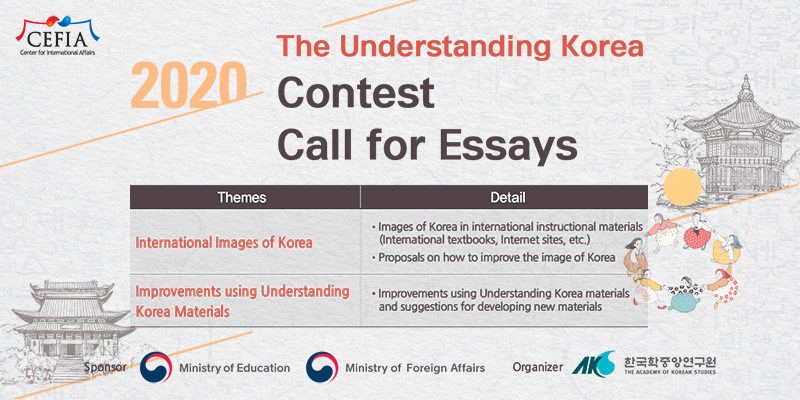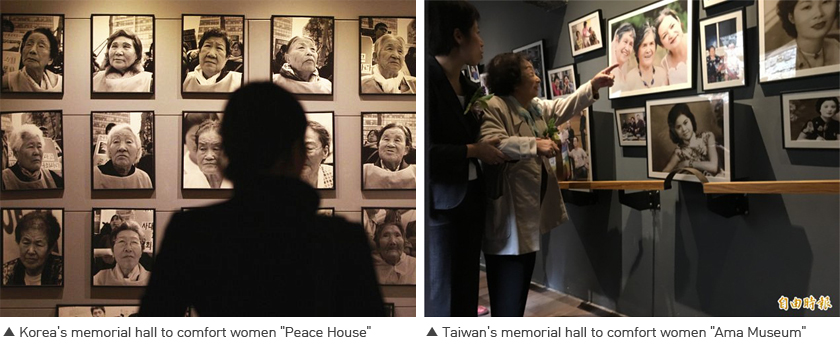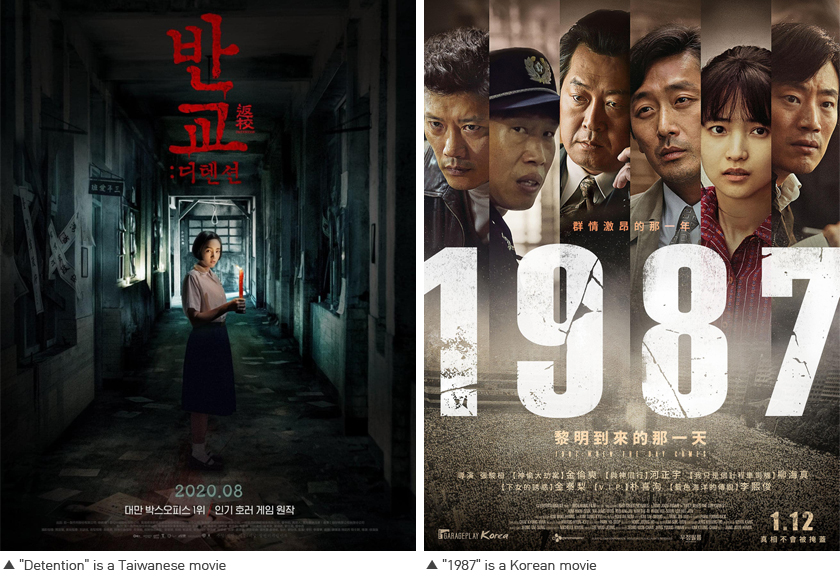Essay Contest Result

Korea's Image in Taiwan, and What It Should Be
"Anti-Korea" in Taiwan
The term "Anti-Korea" is not uncommon in Taiwan. This sentiment was created by the older generation in Taiwan after the breaking of diplomatic ties between Taiwan and Korea in 1992 because they felt Korea had betrayed them. There was no exchange between the two countries for the 12 years following the breaking of diplomatic ties. After that, small controversies in sporting events and fake news spurred this "Anti-Korea" sentiment amongst Taiwanese people even further. In a survey from 2011, young people in Taiwan ranked Korea second after China as the most unfavorable country. However, I would like to question the fact that Taiwanese people really hate Korea based solely from history and past surveys.Various misconceptions of Korea grew as anti-Korean sentiment rose in Taiwan. Incorrect news reports began to say, "Koreans say that Confucius was Korean and that the Dano festival began in Korea." However, these claims are baseless. Korean textbooks state that Confucius was Chinese, and the Dano festival in Gangneung, while having the same name, has a different origin and is a different holiday. Unfortunately, the Taiwanese people of decades ago, who thought of themselves as the rightful heirs of Chinese culture, believed these reports because they were unable to understand them completely. They began to think that Korean people were trying to steal their culture.
Over the past ten years, Taiwanese people have gradually come to accept the fact that the "Republic of China" and "Taiwan" are different. They cherish the rich regional cultures of their country more than in the past, and their self-identity is much more substantial than in the past when they considered themselves merely as heirs of Chinese cultural heritage. Viewing Korea through the eyes of a 23-year-old Taiwanese person, I also wondered at how Koreans tried to treat Chinese culture as their own. After becoming an adult, though, I realized that Koreans weren't trying to do that and that Taiwanese culture isn't necessarily Chinese culture in the first place. The authoritarian education systems in the Republic of China of the past wanted Taiwanese people to think of themselves as the heirs of the old Chinese culture. However, freedom of speech and thought following the democratization of Taiwan has helped Taiwanese people develop their own ways of thinking over the past ten years. In other words, if the breaking of diplomatic ties or controversies over Confucius or Dano festival happened today, there would be a much different response. Taiwanese people might now think of Korea as a country that had broken ties with the "old China" or that had controversies with "Chinese culture," but they wouldn't think Korea had broken ties with "Taiwan" or stolen "Taiwanese culture."
Taiwan's New Perspective on Korea
Many people don't know it, but the word "hallyu," or the "Korean Wave," was first coined in a Taiwanese newspaper in the mid-1990s. Hallyu's beginnings were made possible due to democratization and government policies in both countries. Freedom of the press in both countries was achieved with the cancellation of martial law in Taiwan in 1987 and the June 29 Declaration which made democratic concessions in Korea that same year. Soon after that, the Kim Daejung administration in Korea abolished the film censorship system in Korea in 1998, and cable television was established in Taiwan in 1994. These two measures made it possible for Korean films and dramas to enter the Taiwanese market. Gu Yang Geun, a representative of Korea in Taiwan, stated on August 4, 2011, that hallyu would never have been possible without Taiwan. Because Taiwanese people readily accept foreign cultural products, it became standard for popular Korean industries to first venture into Taiwan before moving on to further Southeast Asian countries and markets. As hallyu became more popular in Taiwan, more than 100 Korean dramas were aired in just one year; and as Korean culture became better represented in the country, Korea's image in Taiwan underwent a significant change.However, the change in sentiment amongst Taiwanese people from "Anti-Korea" to "Pro-Korea" in the early 2000s was limited to these cultural and popular industries. Taiwanese people still found themselves unable to approve of Korea in the realms of politics, foreign relations, and traditional culture due to the past between Taiwan and the old China. However, the last ten years has brought about significant changes in the way Taiwanese people see themselves, and this change has caused many people to reconsider the past between the Republic of China and Korea. As far as Taiwanese people are concerned, the breaking of diplomatic ties in 1992 or Chiang Kai-shek's assistance to the Provisional Government of Korea in Shanghai seem like the history of some "distant countries" - the "old China" and Korea. Taiwanese people no longer share a common way of thinking, and it is now possible for them to look at Korea in a new light.
Actually, "now" is the best time for Taiwanese people to gain a new perspective on Korea. Taiwanese people have in recent years begun to say that "Taiwan has falsely accused Korea in the past, but in fact, the Dano festival and Confucius don't have anything to do with Taiwan." A new idea of what being Taiwanese means has given Taiwanese people a new perspective of their own culture, but exchange with Korea has continued to be based on the relationship with the Republic of China of the past. Very little is known of Korea on mainland Taiwan, and what is known is very limited. Not many people know that the histories of Korea and Taiwan have many similarities. Many clarifications are needed to correct the misunderstandings of the past, and new Taiwanese-Korean exchange must be recognized as a new form of "Taiwanese culture" from now on.
How to Reintroduce Korea in Taiwan
In the past, Taiwanese people had bad perspectives of Korea due to fake news and didn't care to learn about Korea. However, these days Taiwanese people know more about Korea thanks to Korean films, dramas, the introduction of large corporations' products (such as Samsung), and the rise of the Korean economy. Still, this knowledge is often limited to popular culture and economic exchange. Taiwanese knowledge of Korean traditional culture, society and humanities is extremely limited; the only portrayals of Korea in Taiwanese textbooks are beautiful hallyu stars or the Samsung logo.I believe that the best way to understand others is to realize that you share many similarities with them. Therefore, I believe that Korean and Taiwanese people should learn each other's histories.
Similar to Korea, Taiwan experience a long period of authoritarian rule. Because many Taiwanese people received education about "China's history" from the Republic of China for a long time, they are unaware how today's democracy and freedom of the press were formed. Korea has national days of remembrance for many past events (such as the Jeju (4.3) Uprising of April 3, the April (4.19) Revolution, and comfort women), the passing of laws, government compensations, and to correct history. Taiwan has many incidents in its past including the February 28 Incident (similar to Korea's Jeju Uprising), the mass incarceration of revolutionary fighters from Formosa Magazine in the same year as the Bu-Ma Democratic Protests, and conscription of comfort women by the Japanese army. However, compared to Korea, Taiwan is still unable to reconcile its past and bring about transitional justice in many ways. Both Korea and Taiwan won their democratic freedom through opposition to old authoritarian powers, but that shared history is not well known to each other.

Therefore, I believe that along with sharing popular culture, these two countries need a way to recognize each other's histories. While many young Taiwanese people don't have much interest in their own country's history, they were moved after watching the movie 1987 and learning that there are many similarities between Taiwanese and Korean history. Due to political reasons, Taiwan may or may not be able to achieve a lot of formal exchange with Korea; however, Taiwanese people learning more about Korean history and traditional society will make it possible to bring about a better image of Korea in Taiwan by showing them the similarities between the two countries and their history. Movies about Korea's democratization movement have led many Taiwanese people to wonder why the two countries can't get along when they have the same shared experience of struggling and fighting for democracy.
Both Taiwan and Korea have movies about their respective democratization movements. Detention is a Taiwanese movie based on the White Terror period in Taiwan, and 1987 is a Korean movie based on the June Struggle in Korea. While both of these movies are based in history, Detention is an ambiguous science fiction thriller and is liable to receive criticism for this. On the other hand, the Korean movie displays the historical facts as they are and shocked many Taiwanese moviegoers.
Both Taiwan and Korea have movies about their respective democratization movements. Detention is a Taiwanese movie based on the White Terror period in Taiwan, and 1987 is a Korean movie based on the June Struggle in Korea. While both of these movies are based in history, Detention is an ambiguous science fiction thriller and is liable to receive criticism for this. On the other hand, the Korean movie displays the historical facts as they are and shocked many Taiwanese moviegoers.


